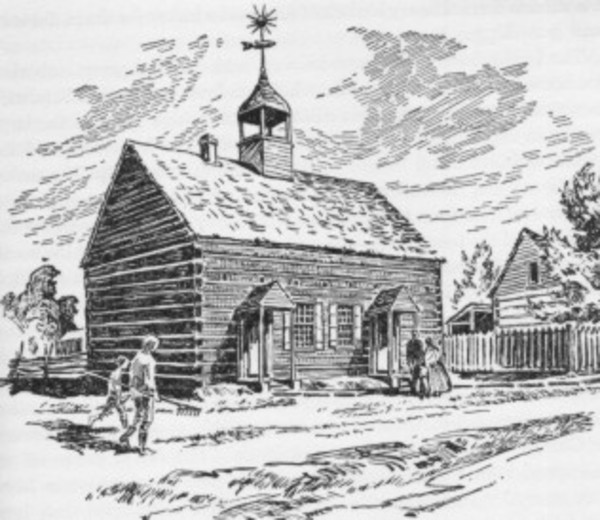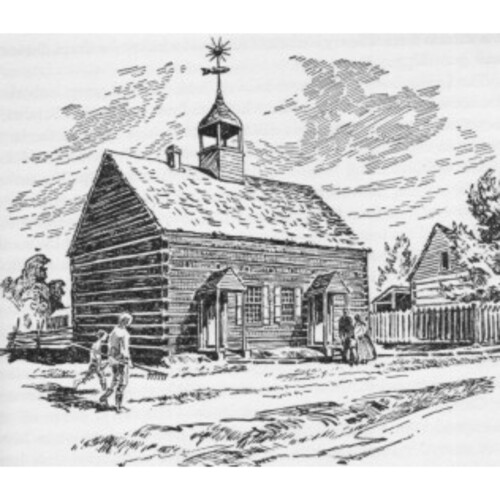
Source: Link
DENKE (Denkey), CHRISTIAN FREDERICK, Moravian missionary; b. 8 Sept. 1775 in Bethlehem, Pa, son of Jeremiah Dencke and Sara Test; m. first 7 Aug. 1803 Anna Maria Heckedorn in Lititz, Pa; m. secondly 12 Sept. 1828 Maria Steiner; d. 12 Jan. 1838 in Salem (Winston-Salem), N.C.
A native of Langenbielau (Bielawa, Poland), Christian Frederick Denke’s father was a prominent Moravian minister in Bethlehem, a major Moravian settlement and centre of missionary activity. At ten years of age Christian entered Nazareth Hall, the Moravian academy at Nazareth, Pa, where his studies included Latin and other languages, theology, management, and also botany in which he took a special interest. He sent many letters and botanical specimens to the noted American botanist Gotthilf Henry Ernest Mühlenberg, first from Nazareth Hall, where Denke became a teacher, and later from Upper Canada until the War of 1812 rendered correspondence impossible.
While teaching, Denke, a deeply religious young man, felt a call to preach to the Indians and in Nazareth he heard David Zeisberger* tell about the Delaware mission at Fairfield in Upper Canada, near present-day Thamesville, and of plans to extend missionary work to the nearby Chippewas. Being a linguist, Denke might learn the Delaware and Chippewa languages in order to translate and to preach to the Indians in their own tongues. On 27 April 1800 he was ordained a deacon and was on his way to the mission fields with John Heckewelder. At Goshen (near Gnadenhutten, Ohio), he received instruction in the Delaware dialect from Zeisberger before leaving for Fairfield. For several years Denke attempted to work with the semi-nomadic Chippewas in their temporary villages on Big Bear Creek (Sydenham River) and the St Clair River. In 1806 Denke and his wife, unsuccessful in their efforts to convert the Chippewas, returned permanently to Fairfield, where they would give years of valuable service in missionary work and education.
The War of 1812 brought disaster to Fairfield. Committed to pacifism, Denke and his partner, John Schnall, tried to keep their Indians neutral but some joined the British forces. Following the battle of Moraviantown on 5 Oct. 1813 [see Henry Procter*], the Americans burned Fairfield, “putting the first torch to the Moravian Church.” The Schnalls returned to Bethlehem leaving the Denkes to lead the Indians to a safe place near Burlington Heights (Hamilton).
For two years the Denkes, unable to communicate with Bethlehem, took full charge of the Indians, with some assistance from the Upper Canadian government. In their winter camp near Dundas there were 183 people at the end of 1813. The following spring they moved to Nelson Township. Denke also ministered to the spiritual needs of the whites in the area. In late June 1814 he began attending the eight men condemned to death for treason at the Ancaster “Bloody Assizes” [see Jacob Overholser*], staying with them day and night until their execution on 20 July.
On 8 May 1815 the Denkes and their converts started their return to Fairfield, a journey of 18 days on foot for the Indians. Besides overseeing the building of a new church and village, called New Fairfield, on the other side of the Thames River, Denke took on responsibilities on behalf of the region’s other settlers. As a member of a committee representing six townships, he prepared pages of information for Robert Gourlay*’s Statistical account. From this source it is evident that Denke and the other missionaries encouraged the practice of a strict moral code while discouraging a number of traditional customs. “Other Indians have vermilion from government to paint their bodies; but the Moravians are forbidden to practise this.”
Denke’s health was undermined by the troubles and responsibilities of the war and reconstruction, and he developed a drinking problem. John Schnall came back to replace him in November 1818, at which time Denke, with his wife, returned to Bethlehem for rest. After two years they accepted a call to Hope Church, in the Salem area of North Carolina, and subsequently they served in Salem and nearby Friedberg. In 1828 Anna Maria Denke died at Friedberg. Three years later Denke and his second wife retired to Salem, where he died in 1838.
According to the “Memoir of the married Brother Christian Friedrich Denke, who went peacefully to sleep in Salem on Jan. 12, 1838,” in the Moravian Arch. (Winston-Salem, N.C.), Denke published a small primer in the Chippewa language, but this has not been located. He is believed, as well, to have written a dictionary which has been published as A Lenâpé-English dictionary; from an anonymous MS. in the archives of the Moravian Church at Bethlehem, Pa., ed. D. G. Brinton and A. S. Anthony (Philadelphia, 1888). Among Denke’s religious works is his Delaware translation of The three Epistles of the Apostle John . . . (New York, 1818).
American Philosophical Soc. (Philadelphia), G. H. E. Mühlenberg, corr. from C. F. Denke, 1798–1811, including “Index floræ Nazarathanæ . . . .” Moravian Arch. (Bethlehem, Pa.), Church diaries; Indian mission records, C. F. Denke, report of first visit among the Tschipues [Chippewas], June 1801; report of new Tschipue Mission, September 1802–March 1803; Fairfield Mission, boxes A-C. R. B. McAfee, “The McAfee papers: book and journal of Robt. B. McAfee’s mounted company, in Col. Richard M. Johnson’s regiment . . . ,” Ky. State Hist. Soc., Reg. (Frankfort), 26 (1928): 128–29. Statistical account of U.C. (Gourlay; ed. Mealing; 1974), 141–42. Elizabeth Graham, Medicine man to missionary: missionaries as agents of change among the Indians of southern Ontario, 1784–1867 (Toronto, 1975). E. E. [Lawson] Gray and L. R. Gray, Wilderness Christians: the Moravian mission to the Delaware Indians (Toronto and Ithaca, N.Y., 1956). E. E. [Lawson] Gray, “A missionary venture on the St. Clair,” Moravian Hist. Soc., Trans. (Nazareth, Pa.), 14 (1951): 341–49. L. R. Gray, “The Moravian missionaries, their Indians, and the Canadian government,” CHA Report, 1955: 96–104.
Cite This Article
Leslie R. Gray, “DENKE (Denkey), CHRISTIAN FREDERICK,” in Dictionary of Canadian Biography, vol. 7, University of Toronto/Université Laval, 2003–, accessed December 31, 2025, https://www.biographi.ca/en/bio/denke_christian_frederick_7E.html.
The citation above shows the format for footnotes and endnotes according to the Chicago manual of style (16th edition). Information to be used in other citation formats:
| Permalink: | https://www.biographi.ca/en/bio/denke_christian_frederick_7E.html |
| Author of Article: | Leslie R. Gray |
| Title of Article: | DENKE (Denkey), CHRISTIAN FREDERICK |
| Publication Name: | Dictionary of Canadian Biography, vol. 7 |
| Publisher: | University of Toronto/Université Laval |
| Year of publication: | 1988 |
| Year of revision: | 1988 |
| Access Date: | December 31, 2025 |



